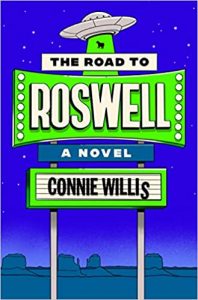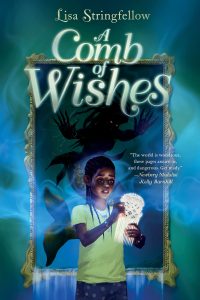Gary K. Wolfe Reviews The Road to Roswell by Connie Willis
 The Road to Roswell, Connie Willis (Del Rey 978-0-593-49985-6, $28.00, 416pp, hc) June 2023.
The Road to Roswell, Connie Willis (Del Rey 978-0-593-49985-6, $28.00, 416pp, hc) June 2023.
Connie Willis’s loyal readers have long known of her fascination with the whole Roswell/UFOlogy circus. More than 20 years ago she published a hilarious chapbook called Roswell, Vegas, and Area 51: Travels with Courtney, in which she described extensive road trips over much of the Southwestern United States, visiting those and other oddball landmarks, from crash sites that always seem to keep shifting around to Dracula-themed Vegas weddings. It’s no wonder this sort of thing appeals to Willis’s imagination, since it brings together so many of her favorite themes and characters: sensible folks (usually young women) surrounded by comically self-absorbed or obsessive friends and family, the tackier aspects of pop culture and pop architecture, classic Hollywood genres like screwball comedies and Westerns – and all gathered under an umbrella mythology, to the embarrassment of many writers and fans, that looks a lot like SF. This is also the source material for The Road to Roswell, an equally funny send-up of conspiracy theorists, true believers, obsessive billionaires, confidence men and women, tatty roadside attractions, secretive government agencies, and even Western movies. (Somehow, Willis has concocted a version of the Wild West in which John Ford and Wile E. Coyote would feel equally at home.) At the same time, it’s an actual first-contact novel, a satisfying if not too surprising rom-com, and an ingeniously plotted thriller in which almost no one is who they first appear to be.
The novel opens with Francie Driscoll making her way to Roswell to be the maid of honor at her best friend’s wedding, though her secret hope is to persuade the friend to call the whole thing off, since the groom is a full-bore alien-abduction conspiracy theorist. To make matters more chaotic, she arrives in the middle of an annual UFO Festival, which Willis describes with exactly the sort of satirical incredulity that we would expect from a serious SF writer in la-la land. What is surprising is that Francie herself encounters an actual alien, which looks nothing at all like a Carlo Rambaldi concoction but rather like a tumbleweed made of a tangle of whiplike and incredibly flexible tentacles. Rather than abduct her in a starship, however, the alien forces her to set out on an apparently aimless road trip through the desert. Along the way, they pick up a self-described con man, a classic little-old-lady casino addict, a wealthy vacationer determined to visit the sites of his favorite Western movies, and one of those true believers who not only buys into the whole Roswell mythology, but thinks that just about every SF movie he’s ever seen is part of it. (Willis may be one of the least political novelists around, but her portrayal of a mindset so delusional that even a lack of evidence becomes evidence is almost as chilling as it is funny, given our own recent politics.) The main plot, driven by the mysterious directions of the alien (who is nicknamed Indy by the con man, after Indiana Jones), is to discover what his real goal is and help him achieve it.
Willis dedicates The Road to Roswell to a number of SF writers who ‘‘first sparked my interest in aliens,’’ including Eleanor Cameron, Heinlein, Wyndham, Bradbury, and Knight, but she could just as well have reached back to an even earlier generation, since Indy, who is essentially the novel’s real protagonist, reminded me of no one so much as Tweel, the birdlike Martian who befriends a crashed astronaut – and then leads him on a wandering trek across the Martian desert – in Stanley G. Weinbaum’s 1934 classic ‘‘A Martian Odyssey’’ (which also features a tentacled beast, but it’s not Tweel). Francie’s determined efforts to communicate with Indy also hark back to classic first-contact tales, with the sometimes-awkward effect of Indy, trying to give directions with his limited and tentative vocabulary, sounding like a petulant six-year-old despite presumably coming from a culture far in advance of ours. At other times he seems like a supporting player in a rom-com – the one who serves as enabler of a budding romance – as he grows determined to see Francie and the con man get together. While we do eventually learn the purpose of Indy’s quest, his main role is to serve as a fulcrum of this appealing if not unfamiliar ensemble cast. As much as The Road to Roswell offers delightful sendups of its main satirical targets, it’s also a thoroughly entertaining road comedy which reminds us that, even though it’s far more mature than in the days of Weinbaum or Eleanor Cameron, SF can still be just a lot of fun.
Gary K. Wolfe is Emeritus Professor of Humanities at Roosevelt University and a reviewer for Locus magazine since 1991. His reviews have been collected in Soundings (BSFA Award 2006; Hugo nominee), Bearings (Hugo nominee 2011), and Sightings (2011), and his Evaporating Genres: Essays on Fantastic Literature (Wesleyan) received the Locus Award in 2012. Earlier books include The Known and the Unknown: The Iconography of Science Fiction (Eaton Award, 1981), Harlan Ellison: The Edge of Forever (with Ellen Weil, 2002), and David Lindsay (1982). For the Library of America, he edited American Science Fiction: Nine Classic Novels of the 1950s in 2012, with a similar set for the 1960s forthcoming. He has received the Pilgrim Award from the Science Fiction Research Association, the Distinguished Scholarship Award from the International Association for the Fantastic in the Arts, and a Special World Fantasy Award for criticism. His 24-lecture series How Great Science Fiction Works appeared from The Great Courses in 2016. He has received six Hugo nominations, two for his reviews collections and four for The Coode Street Podcast, which he has co-hosted with Jonathan Strahan for more than 300 episodes. He lives in Chicago.
This review and more like it in the July 2023 issue of Locus.
 While you are here, please take a moment to support Locus with a one-time or recurring donation. We rely on reader donations to keep the magazine and site going, and would like to keep the site paywall free, but WE NEED YOUR FINANCIAL SUPPORT to continue quality coverage of the science fiction and fantasy field.
While you are here, please take a moment to support Locus with a one-time or recurring donation. We rely on reader donations to keep the magazine and site going, and would like to keep the site paywall free, but WE NEED YOUR FINANCIAL SUPPORT to continue quality coverage of the science fiction and fantasy field.
©Locus Magazine. Copyrighted material may not be republished without permission of LSFF.







Excellent review by Gary K Wolfe of Connie Willis’ book The Road To Roswell, both succinct and poignant.
Good work as always!